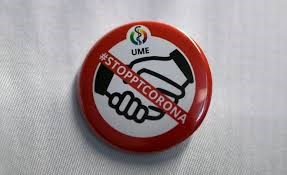Coronavirus has been topping the headlines and is rooted in many conversations among friends, co-workers and casual conversations with acquaintances. Last week, I attended a conference and I also gave a presentation in a seniors’ residence. In both situations, there was little to no handshaking.
If I extended my arm to instigate a shake, some people were very forward and said: “I am avoiding handshakes right now.”
I really liked the direct communication of their wishes. There are many times when I cave in to my own wishes because I don’t want to offend others.
I’ve seen toe-taps and elbow wiggles in place of the handshake, and I don’t personally think either is a good alternative. But I do fully understand why people are refraining.
After a while, I found it quite liberating not to have to feel compelled to shake people’s hands:A friendly “Hello, nice to meet you” was enough.
Like anything in life, there is always a transition period of awkwardness in doing something new. We can all realize that shaking hands isn’t the most sanitary thing and hands are probably the dirtiest parts of our bodies. I wonder if this is the catalyst to the retirement of the handshake in business transactions.
I think if coronavirus sticks around for long enough, we might just get used to ditching this practise.
Interestingly enough, the handshake has been around since the fifth century BC. If coronavirus is the reason for the demise of the handshake, that’s pretty impressive, considering how long the practise has been used. Handshakes originated in Greece, and were a sign of peace and a demonstration that no one was carrying a weapon.
Lately, opting out of a handshake is seen as a sign of respect. It is demonstrating a respect of oneself and others in hopes of not sharing unwanted germs. At this point, I am not sure what to think about the coronavirus. It’s too early to tell how we in Greater Victoria will be affected, but I want to ensure that I don’t opt into a cavalier attitude. I think we should all be taking regular precautions, and if we do get ill, to do our best not to pass it on to anyone else.
A few weeks ago, I was shopping at Costco and the cashier looked at me with a tired expression on their face and said: “Do you need a rain check, too?”
I declined, and then, out of curiosity, I asked what everyone was getting a rain check for. The answer was toilet paper. I didn’t have a clue at this point about the stocking up on toilet paper, mostly because empty toilet paper shelves weren’t making news headlines yet.
I haven’t stocked up on toilet paper at this point, but I would be lying if I said I hadn’t checked our toilet-paper inventory in my home. Up until lately, no one has ever asked me how much toilet paper I have at home or when I plan to buy more.
The last time we had a major outbreak was H1N1 influenza, and at that point, I was really scared because I was pregnant and the outbreak added an entirely new level of uncertainty to a vulnerable time in my life.
When I first heard of coronavirus, it brought me right back to H1N1. I remember reading news articles of people infected with H1N1 and getting really nervous. I had read that pregnant women should ask their doctor for a prescription for medication in case they became infected. It left me feeling very vulnerable and scared.
I think about pregnant women or those who have compromised immune systems right now and how they might be having similar feelings.
If people are nervous and facing anxiety about coronavirus, we should lead with a supportive foot. If someone feels more secure knowing they have stocked up on toilet paper or are declining shaking hands, we should respect them and support people in doing what they need to do to feel prepared for the unknown.
I am OK with not shaking hands with people, and I look forward to seeing what becomes the next socially acceptable business greeting. I sure hope it’s not toe taps, because that could take me a while to get used to.
Charla Huber is the director of communications and Indigenous relations for M’akola Housing Society.



